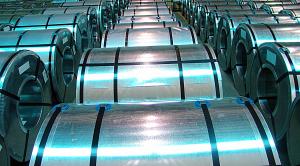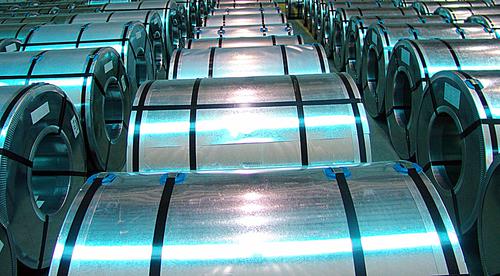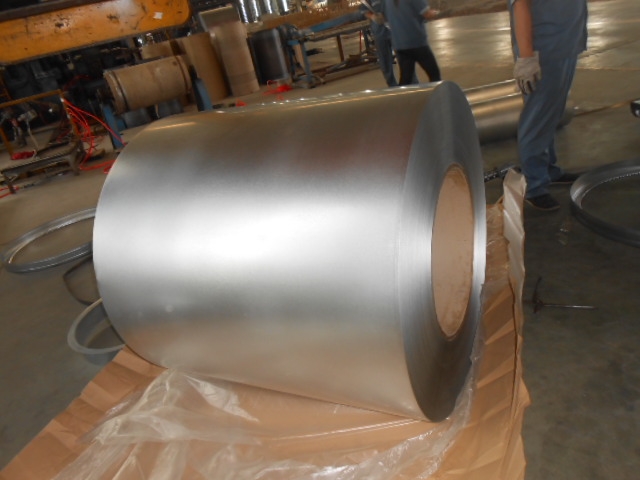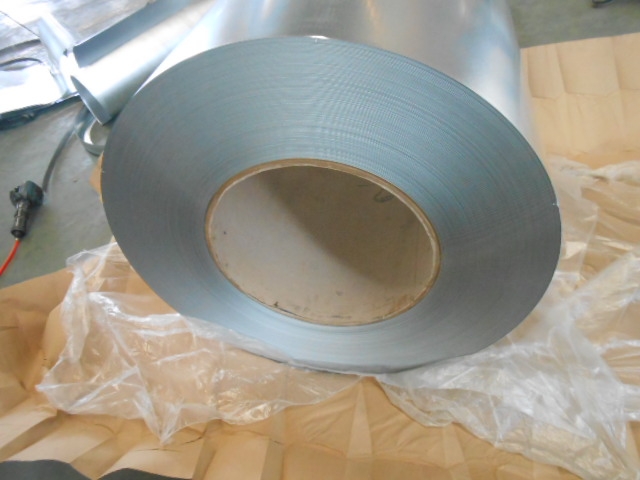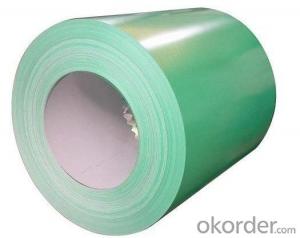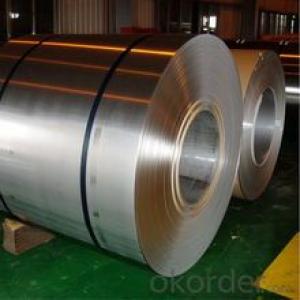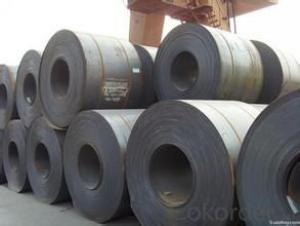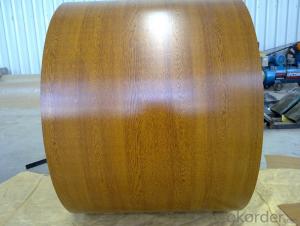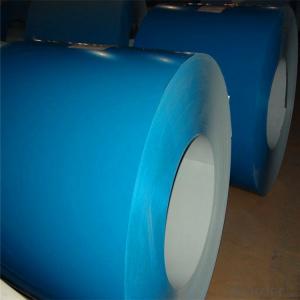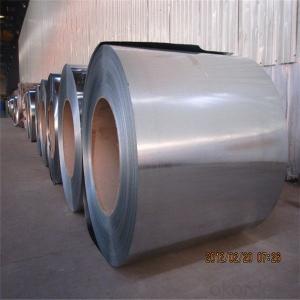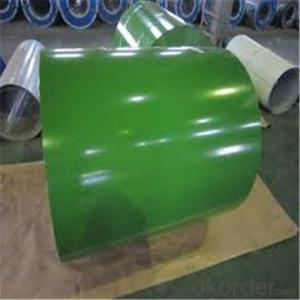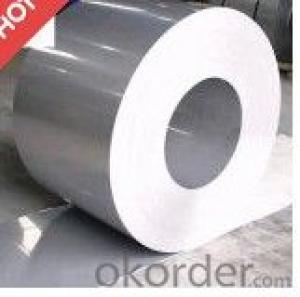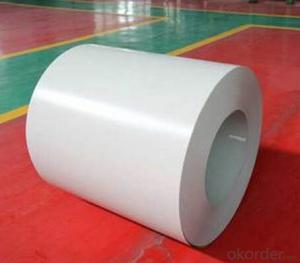ALUZINC STEEL COIL
- Loading Port:
- China Main Port
- Payment Terms:
- TT OR LC
- Min Order Qty:
- -
- Supply Capability:
- -
OKorder Service Pledge
OKorder Financial Service
You Might Also Like
Product Description:
product information:
The Galvalume is a kind of coated steel coil/sheet. With the cold rolled steel of different strength and thickness as substrate, it is produced through applying Al-Zn coat on both faces by hot dip process. In its coating, Al accounts for about 55%, Si 1.6%, while the remaining is Zn. It enjoys both the physical protective feature and durability of Al and the electrochemical protective property of Zn. And its surface has bright silver color and regular embossed-like figure, which are highly decorative.
Specification
1. Thickness: 0.3-0.7mm
2. Width: 914-1250mm
3. Inner Diameter: 508-610mm
4. Weight of Steel Coil: 3-15MT
5. Coating Type: Al-Zn Alloy
6. Available Dipped Layer: 50-150g/m2
7. Surface Finish Structure: Normal Spangle & Small Spangle & Zero Spangle
8. Available Surface Treatment: Passivating & Oiling & AFP & Filming
Mechanical Properties
Grade | Tension Test | ||
Yield Strength (MPa) | Tensile Strength (MPa) | Elongation% No Less Than | |
A80mm | |||
DX51D+AZ | 140-350 | 270-500 | 22 |
DX52D+AZ | 140-300 | 270-420 | 26 |
DX53D+AZ | 140-260 | 270-380 | 30 |
Application
1. Architecture Roofs and outside walls of civilian and industrial buildings, garage doors, fencings and window blinds
2. Appliances Industry Outer clad sheets for washing machine, refrigerator, television, air conditioner and ventilation system, explosion-proof strip, solar water heater and appliance parts
3. Auto Industry Muffler, heat shields of exhaust pipe and catalytic converter, auto parts & accessories under the frame, signboard in highway
4. Industrial Instruments Electric control cabinet, industrial refrigeration equipment, automatic vending machine
- Q: The highest quality i have seen is 9260 and i want to know if there is a higher quality steel.
- Types of steel are one issue. But the quality of steel no matter what type is even more important. The only way to be sure that you are getting a good blade is to buy from someone that already has a reputation for producing great blades. Stop the questions about who thinks what type of steel is best and investigate the steel blades offered by companies like Bugei Trading company. they have good blades. Opinions vary, but Bugei has proven that they make good swords. That is all that is needed to be known. Any questions you have are best directed to them, not here.
- Q: What is the maximum tension that steel coils can withstand during uncoiling?
- The maximum tension that steel coils can withstand during uncoiling depends on various factors such as the type and thickness of the steel, the diameter and width of the coil, and the specific application. However, in general, steel coils can typically withstand tensions ranging from a few hundred pounds to several thousand pounds. It is important to consult the manufacturer's specifications or conduct specific tests to determine the exact maximum tension for a particular steel coil.
- Q: How are steel coils inspected for surface cleanliness during processing?
- Steel coils are inspected for surface cleanliness during processing using various methods such as visual inspection, magnetic particle inspection, eddy current testing, and ultrasonic testing. These techniques help identify any contaminants, defects, or imperfections on the surface of the coils, ensuring that the final product meets the required quality standards.
- Q: How are steel coils used in the manufacturing of structural components?
- Steel coils are used in the manufacturing of structural components by being processed through various techniques such as cutting, bending, and welding to form the desired shapes and sizes. These coils serve as the raw material for fabricating beams, columns, and other structural elements used in buildings, bridges, and infrastructure projects. The high strength and durability of steel make it an ideal choice for constructing load-bearing components, ensuring the stability and integrity of the structures.
- Q: Hi my dad bought a stain steel refridg. yesterday, and we went to clean it and it looks all streaky and gets finger prints and stuff on it too easily we used mr clean multisurface cleaner and it didnt work to well is there a certain type of cleaner we are supposed to use?
- buy stainless steel wipes at the grocery store. they work great.
- Q: I am a complete idiot when it comes to anything musical, so please forgive me if this is a stupid question. I bought my son his first guitar, acoustic and didnt realize until after I purchased it that it has steel strings. Can I have the strings changed from steel to nylon???
- Nylon strings are more commonly used for classical style acoustic guitars, and most standard acoustics are set up to use steel strings. Nylon strings have less tension than steel strings so the sound won't be as full as steel strings. You may also notice some loud vibration from the top of the guitar since the strings don't have the proper tension. A guitar made for nylon strings uses thinner wood and is braced differently than one made for steel strings. The nylon strings won't put enough energy into the steel string guitar to make it vibrate correctly and develop the volume and harmonics that steel strings would. EDIT: To answer the second part of your question, it doesn't really matter what type of strings a beginner learns on. Nylon strings will be a little softer on the fingers, but once you build up calluses on your fingers it doesn't hurt anymore. There is no distinct advantage to a beginner learning with nylon strings as opposed to steel strings.
- Q: is broken steel the only fallout dlc that will raise the level cap from 20 to 30? also do i have to complete the main quest to play it? which fallout dlc do you think would be the best to get?
- Yes, Broken Steel is the only DLC that raises your level cap. Yes, you have to complete the main quest to play it. It's kind of a prologue to the events of the ending. If you don't have the DLC and complete the game it just ends and you can't play it anymore. With the DLC you'll be able to continue playing. As for which one to get, that's your preference. Most people like the Broken Steel because it has to do with the main story and it raises the level cap - so that's the one I'll suggest to you. I also think The Pitt and Point Lookout are worth getting as well. Mothership Zeta is the one I liked least. I thought it was kind of stupid, to be honest. Operation Anchoarge is a simulation and it's pretty fun, but I don't think it's worth the $9.99.
- Q: I am trying to make a homemade fender eliminator for my motorcycle and the instructions from the site I found said to use 22 gage weld steel. I went to lowes and all they had was 26 gage sheet metal. What is the difference between the two? Is weld steel less flexible?
- Gauge is a measure of thickness. 19 Ga = 0.0418 20 Ga = 0.0359 22 Ga = 0.0299 Higher numbers are obviously thinner sheets. To my knowledge the way it works is going up five gauges means the thickness is reduced by half. For example 10 Ga. is 0.1345 in, while 15 Ga is 0.0673 in.
- Q: What kind of insulation should be used in a steel building?
- Fiberglass batts or spray on foam both work well
- Q: in broken steel can you to missions and get things like the dog, you previously didnt do/get in fallout 3?
- I wish you people would put your questions in the right place.
Send your message to us
ALUZINC STEEL COIL
- Loading Port:
- China Main Port
- Payment Terms:
- TT OR LC
- Min Order Qty:
- -
- Supply Capability:
- -
OKorder Service Pledge
OKorder Financial Service
Similar products
Hot products
Hot Searches
Related keywords
